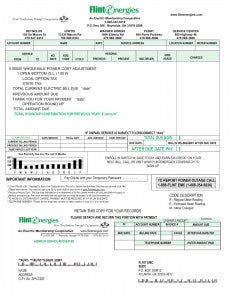Accurate History
Review how much power you’ve used for the last 13 months. We call this the kilowatt hour (kWh) history. This history is provided for you on every bill. You can compare your most recent month to that same month one year ago. Weather fluctuations may be a factor in any major differences, but this is a good place to start your search. The kilowatt hours you use are the main driver of costs on your electric bill. Flint Energies residential customers average about 1300 kWh of energy use per month.
True High Bill
Check to be sure this is a true high electric bill. Are there other charges beyond electric service? Any additional service fees (i.e deposits, connection/disconnection fees or returned check fees)?
- Have any past-due amounts from a previous bill been added to the total?
- Are there ancillary charges added to the bill for other Flint Energies products or services (Water Heater Warranty Program, security lights, etc.)?
- Don’t forget about state and local taxes.
Days of Use
Is the number of days greater than other months in question because of meter readings or meter reading cycles? Is the daily average significantly different from other months in question?Check the number of days that are billed for your electric use. This varies from bill to bill due to the number of days in a month and a billing cycle may be a bit shorter or a bit longer so as not to make your bill due on a weekend or holiday.
Compare Winter to Summer
Check the kilowatt hour total by month. From the history, are the winter months higher, indicating some form of electric heat, higher hot water heater use or heaters being used on water beds? Do the summer months indicate air conditioning? Were temperatures higher or lower than normal during the period? Flint Energies offers a levelized billing program to help members with seasonal fluctuations.

Your electric meter doesn’t go on vacation!
If leave your home for an extended period of time for business or vacation, any appliance you leave plugged in or connected will continue to use electricity even while you are gone, especially your hot water heater, freezer, refrigerator, HVAC system, landscape irrigation, well pump, etc. Most of us note that the TV and lights were not on, but we forget about these items.
Lifestyle
No two households use energy the same way, so comparing your energy bill to your neighbor’s is like comparing apples to oranges. It is best to compare your current use to your past use.
- Determine if the size of your household has increased or if someone stayed at home more.
- Have you added a new swimming pool or hot tub in your back yard?
- Have you had “guests” stay for an extended period?
- Do you have hobbies that include the use of power tools, ovens and other high electrical resistance tools or appliances?
Lighting, refrigeration, cooking and appliances
- Lighting, refrigeration, cooking and appliances account for 56 percent of the total energy use in the normal household. The location of refrigerators and freezers is very important.
- Never place a refrigerator or freezer in direct sunlight or in unconditioned space such as a breezeway, garage or out-building. The refrigerator or freezer will have to work harder to overcome excessive heat during warmer months.
- Make sure that your refrigerators and freezers have adequate ventilation.
Equipment maintenance
If an appliance is more than 15 years old, the efficiency of that appliance may be decreasing significantly and requiring more energy to do its job. It is important to clean or replace the condenser, coils or filters on some appliances regularly. You may need to replace the appliance itself. Many times old electrical wiring will have loose connections resulting in increased electrical use and create potential safety hazards.
Seasons
The additional heating or cooling load will cause an increase in electric use. Heating and cooling your home averages around 44 percent of your total energy use. Using space heaters, fireplaces, livestock heaters or vehicle block heaters in the winter can dramatically increase your energy consumption. Running a dehumidifier or watering of lawns, gardens and animals in the summer months will increase your energy use.
Weather
Lightning can sometimes damage your well pump, sump pump or appliances increasing the running of these devices. If underground wiring-insulation is damaged, an increase in electrical use may occur when the ground is saturated with moisture. You may want to consider having Flint Energies test your home’s ground rod installations.
Construction or remodeling activities
Has there been any underground excavation recently? If you have underground wiring, the electrical wires may have been knicked, resulting in a direct short. Many times room additions are completed without proper sizing of HVAC for additional heating and cooling loads.
Field Visits
If after studying all the above information, you still feel there may be a deeper problem, we are happy to take your call and assist you. After handling the high bill complaint on the phone, we determine if a field visit is necessary to determine any energy efficiency problems or check the meter. Flint Energies ‘s Member Services Department can offer efficiency solutions.
When should I ask Flint Energies to test my meter?
Flint Energies encourages customers to look for the cause in the above situations first. Meter tests should be a last resort instead of first. Meters measure energy use and because they are a mechanical device it is rare that they run fast. They are seldom the cause of a higher bill but are often blamed. Less than 2 out of 1,000 meters are going to be wrong when tested. This includes running slow or running fast. Most old meters, however, will likely run slow. A faulty meter would more likely run slow. In the case of a meter check, a Flint Energies field representative will check the meter. If you are interested in learning more about your energy use, take a look at Flint’s In Home Guide to Electricity for information and tips for decreasing your use.

